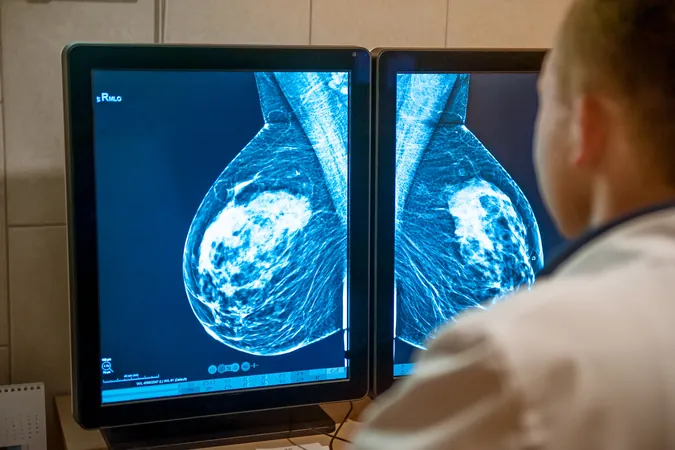
Shocking Discovery: Even Healthy Women May Harbor Potentially Cancerous Cells in Breast Tissue!
2024-11-27
Author: Yu
Groundbreaking Study Reveals Alarming Findings
A groundbreaking study published in *Nature* has revealed alarming findings: healthy women may have breast cells that, while appearing normal, possess chromosome abnormalities typically linked to invasive breast cancer. This startling evidence could revolutionize our understanding of breast cancer's genetic foundations and has significant implications for early detection methods.
Study Overview
In this study, researchers examined breast tissue samples from 49 healthy women who underwent breast reduction surgery. By employing advanced single-cell DNA sequencing techniques, they scrutinized alterations in chromosomal copy numbers, comparing the normal breast tissue against established clinical breast cancer data. This extensive analysis included 83,206 epithelial cells and incorporated various sequencing methods for a deeper understanding of how these cells may lead to cancer.
Key Findings
The results were eye-opening. Every woman studied exhibited rare aneuploid epithelial cells, with a median prevalence of 3.19%, in their normal breast tissues. Notably, the prevalence of these cellular abnormalities appeared to increase with age; older participants displayed a higher frequency of these changes compared to their younger counterparts. Additionally, an astonishing 82.22% of the identified aneuploid cells underwent clonal expansions, mirroring alterations typical of invasive breast cancers.
Chromosomal Changes
Among the most frequent chromosomal changes detected was an increase in chromosome 1q copies, alongside losses of chromosomes 10q, 16q, and 22q. These findings are particularly concerning as previous research has associated these chromosomal regions with breast cancer pathogenesis.
Expert Insights
Dr. Nicholas Navin, the principal investigator and chair of Systems Biology, stated, "A cancer researcher or oncologist seeing the genomic picture of these normal breast tissue cells would classify them as invasive breast cancer. We’ve always been taught that normal cells have 23 pairs of chromosomes, but that appears to be inaccurate. Every healthy woman analyzed had irregularities, raising intriguing questions about when cancer actually begins."
Implications for Screening
As significant as these findings are, they also present challenges for future screening methods, including molecular diagnostics and biopsies. The risk of false positives is heightened, as benign cells might be misidentified as precursors to invasive breast cancer.
Broader Impact on Cancer Research
The implications of this research extend beyond breast cancer. The presence of abnormal epithelial cells in other organ systems could influence our understanding of various cancer types. The study's co-assay profiling indicated that these aneuploid cells related primarily to two luminal epithelial lineages, persisting in ductal and lobular structures that appeared histologically normal.
Conclusion and Future Directions
"This discovery reminds us that our bodies are not perfect, and over time, we can accumulate these types of cells," Dr. Navin added. "While this doesn’t mean everyone is harboring precancerous cells, it underscores the necessity for larger studies to decode the potential risk factors that might contribute to these abnormalities turning cancerous."
Call to Action
As researchers continue to unravel the complexities behind these cellular findings, the medical community is urged to reassess testing and early detection protocols to include these new insights. With cancer affecting millions, understanding the subtle distinction between normal and potentially harmful cellular changes could ultimately lead to more effective prevention strategies and therapies. Stay tuned for updates as this story continues to develop!

 Brasil (PT)
Brasil (PT)
 Canada (EN)
Canada (EN)
 Chile (ES)
Chile (ES)
 España (ES)
España (ES)
 France (FR)
France (FR)
 Hong Kong (EN)
Hong Kong (EN)
 Italia (IT)
Italia (IT)
 日本 (JA)
日本 (JA)
 Magyarország (HU)
Magyarország (HU)
 Norge (NO)
Norge (NO)
 Polska (PL)
Polska (PL)
 Schweiz (DE)
Schweiz (DE)
 Singapore (EN)
Singapore (EN)
 Sverige (SV)
Sverige (SV)
 Suomi (FI)
Suomi (FI)
 Türkiye (TR)
Türkiye (TR)